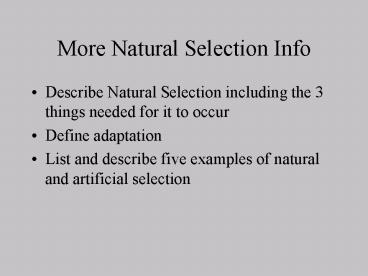More Natural Selection Info - PowerPoint PPT Presentation
1 / 29
Title:
More Natural Selection Info
Description:
More Natural Selection Info. Describe Natural Selection including the 3 things ... A seabird carries a few seeds, stuck to its feathers, from the mainland to a ... – PowerPoint PPT presentation
Number of Views:51
Avg rating:3.0/5.0
Title: More Natural Selection Info
1
More Natural Selection Info
- Describe Natural Selection including the 3 things
needed for it to occur - Define adaptation
- List and describe five examples of natural and
artificial selection
2
Natural Selection
- 1. There is competition for limited resources
- 2. There is natural variation (behavior, traits)
- 3. The variation is inherited
- The outcome of variation in heritable traits that
affect survival and reproduction
3
Adaptation
- The consequence of natural selection is
adaptation - Adaptation some heritable aspect of form,
function, behavior or development that improves
the odds for surviving or reproducing in a given
environment.
4
Artificial Selection
http//www.gly.uga.edu/railsback/1122/1122Dogs.jpe
g
5
Artificial Selection
http//www.bio.miami.edu/dana/160/artificialselect
ion.jpg
6
Natural Selection
http//www.museums.org.za/bio/insects/cockroaches/
http//home-supplies.best-emporium.com/cat-125/Cle
aning-Sanitation/Cleaning-Chemicals/Rodenticide-In
secticides/
7
Natural Selection
Staphylococcus aureus antibiotic resistance
8
Population Information
- Define population
- Describe the basis and source of heritable
variation within a population - If there are heritable variations within a
population, when does evolution not occur?
9
How would you define POPULATION?
- all organisms that constitute a specific group
(species) in a specific habitat/environment
10
Review of Genetics
- Cells are the basic unit of life
- Cells have DNA
- DNA contains genes
- Genes code for proteins, usually enzymes
- Genes that differ slightly are called alleles
- Different alleles make different forms of the
same enzyme - These enzymes determine an organisms phenotype
- Alleles can be inherited
11
Population Genetics
- Gene pool all the alleles of all the genes in
all the individuals in a population - Each organism will have a unique combination of
alleles and, therefore, a unique phenotype - Unique combination of alleles
- Mutation
- Crossing-over
- Independent assortment
- Fertilization
- Change in chromosome number or structure
12
Population Genetics
- Allele frequency relative proportion of one
allele for one gene - Evolution change in the allele frequency within
a population
13
How does Evolution Occur?
- Describe how evolution can occur
- Mutation
- No gene flow
- Small population size
- Non-random mating
- Natural selection
- Disruptive
- Directional
- Stabilizing
14
Violation of equilibrium mutation
- Mutations are rare (1/100,000 gametes)
- Mutations can be
- Helpful
- Depends on
- environment
- Neutral
- Harmful
- Lethal mutation
15
Gene Flow
- Individuals, and their alleles, move into and out
of populations - The physical flow counters the effects of
- mutation
- natural selection
- genetic drift
16
Small Population Size
- Hypothesis how often will you get tails?
- Flip a coin ten times
- heads
- tails
- Everyone flip a coin ten times
- heads
- tails
- Discuss the difference between 10 and 200 events
sampling error
17
Small Population
- Random events can have drastic effects on the
allele frequencies in a small population Genetic
Drift - Two examples
- Founder effect
- Bottleneck
18
phenotypes of original population
Founder Effect
A seabird carries a few seeds, stuck to its
feathers, from the mainland to a remote oceanic
island.
phenotype of island population
19
Bottleneck Effect Elephant seal
Reduction of a populations gene pool produced
when a few members survive the widespread
elimination of a species.
Año Nuevo State Park
http//www.aad.gov.au/default.asp?casid1239
20
Non-random mating
- Do humans mate randomly?
- How do people pick a mate?
21
Non-random mating 3 types
- Assortive shifts genotype frequency
- Organisms choose a mate with the same genotype as
themselves. - Organisms choose a mate with a different genotype
from themselves. - Self-fertilization shifts genotype frequency
- Organism mates with itself
- Sexual selection shifts allele frequency
- Some genotypes mate more successfully than others
22
Assortive Mating
23
Self-fertilization
24
Sexual selection
http//subjunctive.net/photoblog/2003/peacock-wooi
ng-peahen.jpg
25
Natural Selection
- Evolution due to natural selection results from
unequal reproduction of various alleles - Natural selection acts on phenotypes but affects
genotypes - Adaptations help an individual survive and
reproduce
26
Agents of Natural Selection
- Abiotic factors
- Climate
- Geology
- Other non-living factors
- Biotic factors
- Competition
- Food, Shelter, Mating
- Interspecies Interactions
- Predation
- Sexual Selection
27
3 Modes of Natural Selection Directional
Selection
28
Number of individuals
3 Modes of Natural Selection Stabilizing
Selection
Range of values at time 1
29
3 Modes of Natural Selection Disruptive
Selection
Number of individuals
Range of values at time 1































